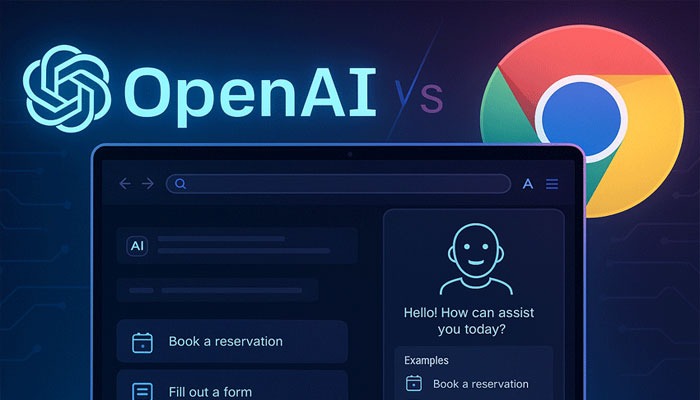In a move that could reshape the digital landscape, OpenAI is finalizing an artificial intelligence-powered web browser set for release within weeks, according to exclusive reporting by Reuters. The browser represents a direct challenge to Google Chrome’s dominance and marks OpenAI’s most aggressive expansion into consumer technology since ChatGPT’s launch in 2022.

The AI Browser Experience
Built atop Google’s open-source Chromium code the same foundation powering Chrome, Microsoft Edge, and Opera OpenAI’s browser will fundamentally reimagine user interaction. At its core will be a ChatGPT-like interface that enables conversational browsing, allowing users to engage with AI agents directly within the browser environment. OpenAI’s Operator agent will reportedly perform tasks such as booking reservations, completing forms, and summarizing content without requiring users to navigate through multiple websites.
“What distinguishes this approach is the tight integration between browsing and AI execution,” explained Dr. Elena Torres, a human-computer interaction researcher at Stanford University. “Instead of treating the browser as a passive window to the internet, OpenAI envisions an active assistant that anticipates needs and completes tasks within the flow of browsing.”
Strategic Shift Toward Data Independence
The browser launch signals a strategic pivot for OpenAI as it seeks greater independence from established tech giants. By controlling the browsing environment, OpenAI gains direct access to user behavior data, a cornerstone of Google’s advertising empire that generates nearly three-quarters of Alphabet’s revenue. With over 500 million weekly ChatGPT users potentially migrating to this new platform, the browser could disrupt Google’s data advantage while creating new training opportunities for OpenAI’s models.
“Many have rightly expressed concern about personal data collection by AI companies, but we shouldn’t overlook the vast troves Google has accumulated through Chrome,” noted Jake Moore, Global Cybersecurity Advisor at ESET. “A new browser offers choice in an increasingly competitive landscape for user data, though profiling may still underpin its functionality”.
Uphill Battle in a Saturated Market
OpenAI faces significant market challenges. Google Chrome currently commands 68% of the global browser market with over 3 billion users, while Apple’s Safari trails distantly at 16%. Even with ChatGPT’s massive user base, convincing users to switch default browsers has historically proven difficult.
The timing coincides with increased antitrust scrutiny of Google’s browser dominance. The U.S. Department of Justice has demanded Chrome’s divestiture following a federal ruling that Google maintains an unlawful monopoly in online search a decision the company plans to appeal. OpenAI executives previously expressed interest in acquiring Chrome should it become available through antitrust proceedings.
Emerging AI Browser Ecosystem
OpenAI enters a rapidly evolving space where competitors like Perplexity launched their Comet browser just this week, while The Browser Company and Brave have released AI-powered alternatives. These platforms share a common vision: reducing friction between information seeking and task completion through agentic AI.
Industry analysts see OpenAI’s move as part of a broader ambition to integrate AI across work and personal contexts, following its recent $6.5 billion acquisition of hardware startup io from Apple’s former design chief Jony Ive. This positions OpenAI to potentially develop integrated AI hardware and software ecosystems.
Implications for the Future of Browsing
Beyond competitive dynamics, the browser raises fundamental questions about how we interact with information. Recent Microsoft and Carnegie Mellon University research suggests AI tools may “inhibit critical engagement” if users become overly dependent. “We must balance convenience with cognitive preservation,” cautioned Dr. Marcus Chen, who co-authored the study. “The risk lies in creating systems so efficient they diminish our problem-solving capacities”.
As the late-July launch window approaches, industry observers await details on how OpenAI will differentiate its offering. With promises of ad-free searching, enhanced privacy controls, and seamless AI integration, the browser could represent the most significant challenge yet to Google’s twenty-year browser dominance if users embrace a fundamentally new way of navigating the digital world.
Subscribe to my whatsapp channel


Comments are closed.